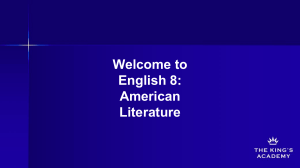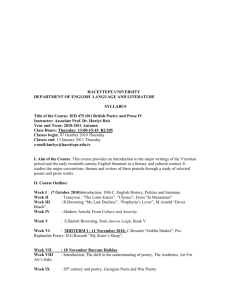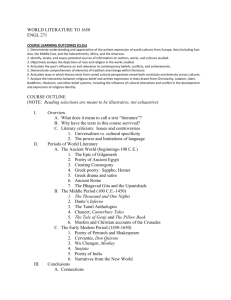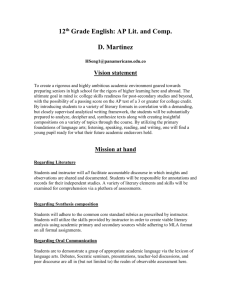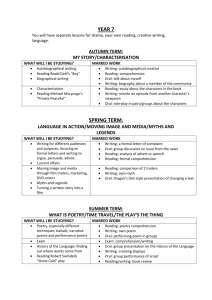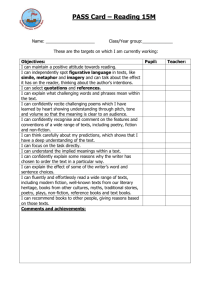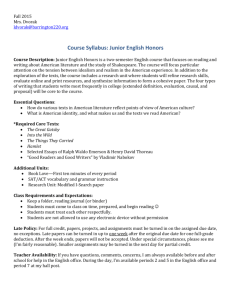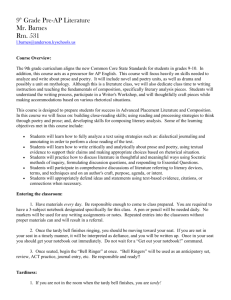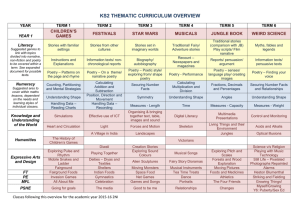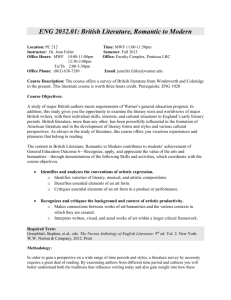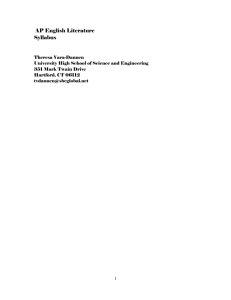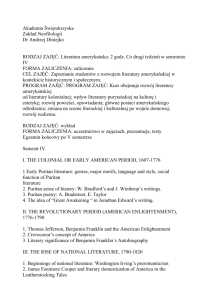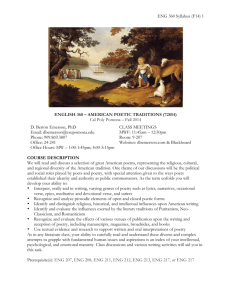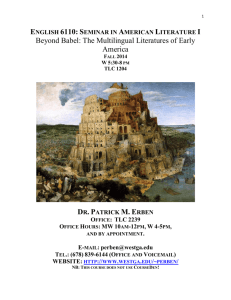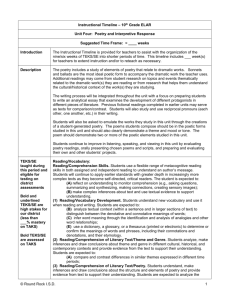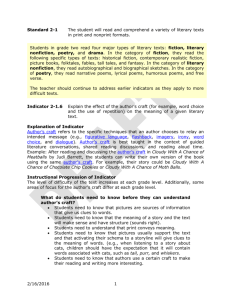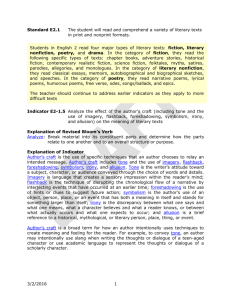Classroom Rules:
advertisement
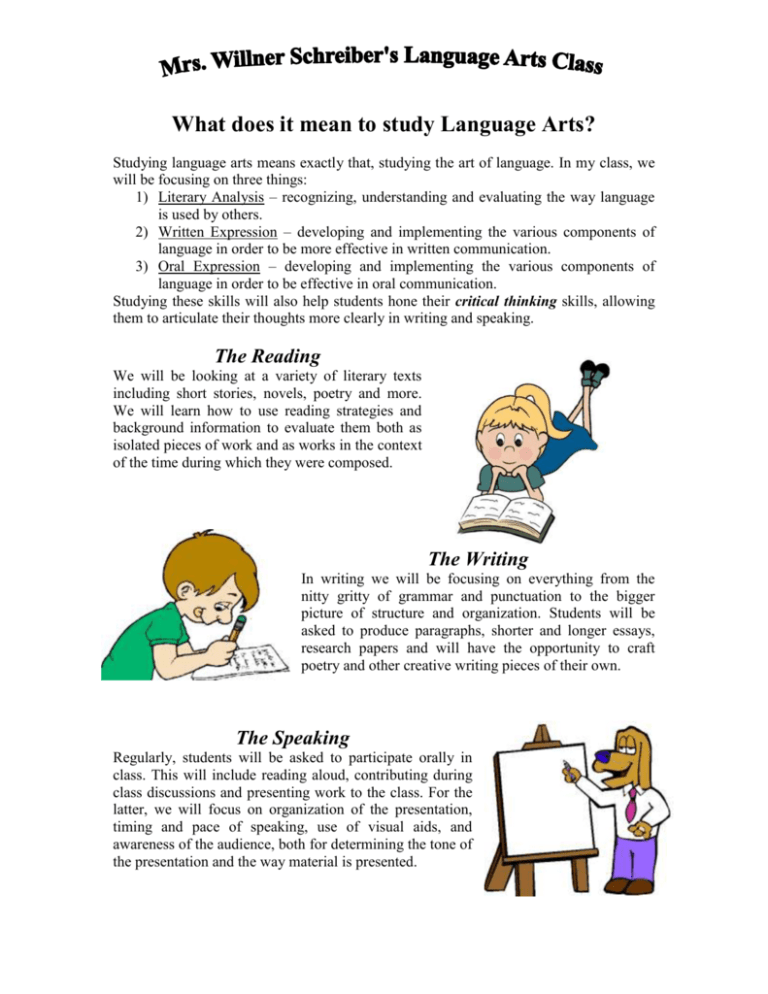
What does it mean to study Language Arts? Studying language arts means exactly that, studying the art of language. In my class, we will be focusing on three things: 1) Literary Analysis – recognizing, understanding and evaluating the way language is used by others. 2) Written Expression – developing and implementing the various components of language in order to be more effective in written communication. 3) Oral Expression – developing and implementing the various components of language in order to be effective in oral communication. Studying these skills will also help students hone their critical thinking skills, allowing them to articulate their thoughts more clearly in writing and speaking. The Reading We will be looking at a variety of literary texts including short stories, novels, poetry and more. We will learn how to use reading strategies and background information to evaluate them both as isolated pieces of work and as works in the context of the time during which they were composed. The Writing In writing we will be focusing on everything from the nitty gritty of grammar and punctuation to the bigger picture of structure and organization. Students will be asked to produce paragraphs, shorter and longer essays, research papers and will have the opportunity to craft poetry and other creative writing pieces of their own. The Speaking Regularly, students will be asked to participate orally in class. This will include reading aloud, contributing during class discussions and presenting work to the class. For the latter, we will focus on organization of the presentation, timing and pace of speaking, use of visual aids, and awareness of the audience, both for determining the tone of the presentation and the way material is presented. Course Syllabus: Why We Read During the first part of the year, students will explore the question “Why do we read?” through Bridge to Terabithia by Katherine Paterson and The Adventures of Tom Sawyer by Mark Twain. In both of these texts the main characters use literature to enhance their everyday lives. Tom Sawyer draws inspiration from stories he has read in order to craft his famously fanciful games and adventures. The protagonists in Bridge to Terabithia use literature to create a fantasy world in which they can confront and overcome giants and villains who represent struggles they encounter at school and at home. Students will learn how to annotate and think critically as they read texts as well as how to analyze plot structure and evaluate other literary elements such as setting, characters, conflict and theme. Throughout the year, students will also be required to read three approved books outside of class (one per trimester) and report on them in class. Why We Write The second unit of the year will explore the question, “Why do we write?” During this unit students will read and analyze poetry, exploring the many ways people use writing to express themselves and their views. We will also discuss Twain’s inclusion of social commentary as we continue exploring Tom Sawyer. In addition to reading the poetry and works of others, students will have the opportunity to craft their own poetry and creative writing pieces, considering the functions that such enterprises can serve in their own lives. Throughout the year, students will also be developing the following skills in writing: Crafting complete answers to questions using textual evidence Writing complex sentences while avoiding run-ons and fragments Maintaining tense consistency Determining appropriate forums for formal and informal writing, including the use of contractions Paragraph and essay organization Outlining Thesis development Hook and “So what” development Using textual evidence to support claims Incorporating in-text citations Researching a topic and composing a research paper Why We Wonder The final unit of the year will be focused on the question, “Why do we wonder?” Students will have the opportunity to research a topic of interest to them. They will learn to take ownership of their own learning and inquiry as they ask questions and explore their subject on a deeper level. During this unit, they will practice research methods and will learn how to construct a research paper, including citations from multiple texts and a final bibliography. Classroom Rules/Expectations: 1) 2) 3) 4) 5) Cooperate with your teacher and classmates. Respect the rights and property of others. Carry out your “Basic Student Responsibilities.” Be seated and prepared for class on time. Listen respectfully to teachers, guests or peers when they are presenting. Basic Student Responsibilities Keep track of your own books and assignments. Ask for help when you need it. Do your own work. Turn work in on time. Accept responsibility for grades and other consequences. Come to class prepared with required supplies. Bring to Class Every Day Pens/pencils/erasers LA folder(s)/ binder LA spiral notebook/ paper Assignment Notebook Flash Drive or other means of storing work Text(s) that we are studying A book to read for pleasure Homework due that day Classroom Policies: Absences If a student knows in advance that s/he will be absent from class, it is his/her responsibility to let the teacher know as early as possible and to work with the teacher in order to stay on top of his/her classwork. If a student is unexpectedly absent from class due to illness or unforeseen circumstances he/she should contact the teacher when it is possible to come up with a plan in order to stay on top of his/her classwork. Given that a large portion of success in Language Arts is dependent upon in-class discussions and instruction, it is imperative that students attend class regularly. In the case of excessive absences, the student’s grade may be lowered by up to one full letter grade. Tardiness Students must be in class and seated and ready to begin when the period is scheduled to start in order to be considered “on time.” Students who are tardy to class must bring a note from an adult in order to be excused from the tardy. If a student acquires three unexcused tardies s/he will be asked to see me during recess. Parents will be notified if a student is frequently tardy without a note. Homework Students who fail to turn in homework will be sent home with a “Missing/Late Homework Slip” to be signed by a parent and attached to late work. Late homework will receive a lower grade. Any work that is plagiarized, either from a professional source or copied from another student, will receive an automatic zero. Students who are remiss in turning in assignments regularly, may be asked to stay for Homework Help. Leaving Class If a student must leave the room for the bathroom, water fountain, to retrieve missing materials, or any other non-emergency reason, s/he is expected to do so quietly and with minimal disturbance to others. Students must sign out and in each time they leave the room, unless going to the water fountain. Students are responsible for catching up on all work that they miss when out of the room and must do so outside of class time. Abuse of this privilege may lead to loss of the privilege.


